9 books about Reinharz, Jehuda

Chaim Weizmann
A Biography
Jehuda Reinharz and Motti Golani
Brandeis University Press, 2024
A magisterial biography of Israel’s first president.
In Chaim Weizmann: A Biography, Jehuda Reinharz and Motti Golani show how Weizmann, a leader of the World Zionist Organization who became the first president of Israel, advocated for a Jewish state by gaining the support of influential politicians and statesmen as well as Jews around the world. Beginning with his childhood in Belorussia and concluding with his tenure as president, Reinharz and Golani describe how a Russian Jew, who immigrated to the United Kingdom in the early twentieth century, was able to advance the goals of Theodor Herzl, the founder of the Zionist Organization. Weizmann is also shown as a man of human foibles—his infatuations, political machinations, and elitism—as well as a man of admirable qualities—intelligence, wit, charisma, and dedication.
Weizmann, who came to the UK to work as a biochemist, was in regular communication with British political figures, including prime ministers Arthur James Balfour, David Lloyd George, Winston Churchill, and Ramsay MacDonald. He also met presidents of the United States from Woodrow Wilson to Harry Truman. His success in earning the support of British political figures helped lead to the Balfour Declaration, which advocated for a “national home” for the Jewish people in Palestine.
As the authors show in this authoritative account of Weizmann’s life, Weizmann was guided by the belief that “Zion shall be redeemed in justice,” a phrase that recurs often in his writings.
In Chaim Weizmann: A Biography, Jehuda Reinharz and Motti Golani show how Weizmann, a leader of the World Zionist Organization who became the first president of Israel, advocated for a Jewish state by gaining the support of influential politicians and statesmen as well as Jews around the world. Beginning with his childhood in Belorussia and concluding with his tenure as president, Reinharz and Golani describe how a Russian Jew, who immigrated to the United Kingdom in the early twentieth century, was able to advance the goals of Theodor Herzl, the founder of the Zionist Organization. Weizmann is also shown as a man of human foibles—his infatuations, political machinations, and elitism—as well as a man of admirable qualities—intelligence, wit, charisma, and dedication.
Weizmann, who came to the UK to work as a biochemist, was in regular communication with British political figures, including prime ministers Arthur James Balfour, David Lloyd George, Winston Churchill, and Ramsay MacDonald. He also met presidents of the United States from Woodrow Wilson to Harry Truman. His success in earning the support of British political figures helped lead to the Balfour Declaration, which advocated for a “national home” for the Jewish people in Palestine.
As the authors show in this authoritative account of Weizmann’s life, Weizmann was guided by the belief that “Zion shall be redeemed in justice,” a phrase that recurs often in his writings.
[more]
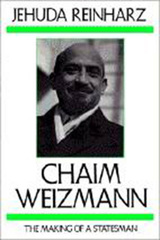
Chaim Weizmann
The Making of a Statesman
Jehuda Reinharz
Brandeis University Press, 1985
This massively researched, deftly written narrative follows Weizmann's life from the beginning of the First World War through some of his greatest triumphs--the Balfour Declaration, the founding of the Hebrew University of Jerusalem, and the British Mandate for Palestine. Like the first volume, The Making of a Statesman combines intimate detail with incisive analysis. Reinharz untangles the internal politics of the World Zionist Organization as he charts Weizmann's rise to prominence. We see Weizmann struggling with fellow Zionists over his pro-British policies and his increasingly authoritarian leadership. We see him as a persuader and diplomat, a charming figure who could win influence in elite British circles without downplaying his Jewish identity or heritage. Reinharz offers fresh insights into Weizmann's brilliance as a chemist. No other historian has ever explained Weizmann's scientific accomplishments and their ties to his Zionist diplomacy. Reinharz follows the difficult negotiations that produced the triumphant Balfour Declaration. He carries the story through Weizmann's work in Palestine to found a vibrant Jewish community. Weizmann's largely unsuccessful efforts to open a friendly dialogue with the Arabs are also fully explored. Chaim Weizmann was a towering figure of twentieth-century Zionism and the first president of the State of Israel. In every way, this monumental biography is worthy of this great statesman.
[more]
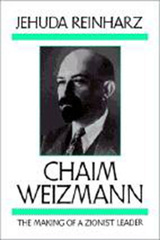
Chaim Weizmann
The Making of a Zionist Leader
Jehuda Reinharz
Brandeis University Press, 1985
In the pantheon of modern Jewish leaders, Chaim Weizmann is a giant. One of the founding fathers of the State of Israel and its first president, he was also a president of the World Zionist Organization, and an eminent chemist, for whom Israel's renowned Weizmann Institute of Science was named. Yet, until now, there has never been an authoritative biography of Weizmann that removed the layers of myth obscuring our image of the man. Both a personal portrait of a fascinating man and a far-reaching history of the Jews in the modern world, this book, written by one of America's leading authorities on Jewish history, delves into the factors that shaped Weizmann's personality and worldview. Though the book focuses on the making of Weizmann as a Zionist leader, it also lays the foundations for understanding his extraordinary achievements as a scientist. This volume, the first of two that will cover his entire career, ends when, at the age of 40, Weizmann is thrust onto the center stage of world politics as a major negotiator for the Balfour Declaration.
[more]

Glorious, Accursed Europe
Jehuda Reinharz and Yaacov Shavit
Brandeis University Press, 2010
This volume offers a fascinating look at the complex relationship between Jews and Europe during the past two hundred years, and how the European Jewish and non-Jewish intelligentsia interpreted the modern Jewish experience, primarily in Germany, Russia, and Central and Eastern Europe. Beginning with premodern European attitudes toward Jews, Reinharz and Shavit move quickly to “the glorious nineteenth century,” a period in which Jewish dreams of true assimilation came up against modern antisemitism. Later chapters explore the fin-de-siècle “crisis of modernity”; the myth of the modern European Jew; expectations and fears in the interwar period; differences between European nations in their attitude toward Jews; the views of Zionists and early settlers of Palestine and Israel toward the Europe left behind; and views of contemporary Israeli intellectuals toward Europe, including its new Muslim population—the latest incarnation of the Jewish Question in Europe.
[more]

Inside the Antisemitic Mind
The Language of Jew-Hatred in Contemporary Germany
Monika Schwarz-Friesel and Jehuda Reinharz
Brandeis University Press, 2017
Antisemitism never disappeared in Europe. In fact, there is substantial evidence that it is again on the rise, manifest in violent acts against Jews in some quarters, but more commonly noticeable in everyday discourse in mainstream European society. This innovative empirical study examines written examples of antisemitism in contemporary Germany. It demonstrates that hostility against Jews is not just a right-wing phenomenon or a phenomenon among the uneducated, but is manifest among all social classes, including intellectuals. Drawing on 14,000 letters and e-mails sent between 2002 and 2012 to the Central Council of Jews in Germany and to the Israeli embassy in Berlin, as well as communications sent between 2010 and 2011 to Israeli embassies in Austria, Switzerland, Belgium, England, Ireland, the Netherlands, Sweden, and Spain, this volume shows how language plays a crucial role in activating and re-activating antisemitism. In addition, the authors investigate the role of emotions in antisemitic argumentation patterns and analyze “anti-Israelism” as the dominant form of contemporary hatred of Jews.
[more]
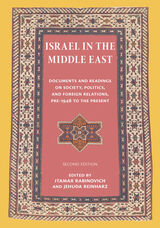
Israel in the Middle East
Documents and Readings on Society, Politics, and Foreign Relations, Pre-1948 to the Present
Edited by Itamar Rabinovich and Jehuda Reinharz
Brandeis University Press, 2007
This timely anthology, completely revised and updated from the original edition in 1984, provides convenient access to the most significant documents of the Zionist movement since 1882 and of Israel’s domestic and foreign policy issues between 1948 and 2006. Comprised largely of primary sources from Israeli, Arab, and American records, documents encompass not only political and diplomatic history but economic, cultural, legal and social aspects of the region as well. The second edition also addresses areas not covered by the 1984 volume: a new chapter on the pre-state period, additional documents that reflect the Palestinian perspective, and the voices of women. Divided into seven chronological sections, documents are introduced by an overview of the entire era. They are annotated and preceded by explanatory headnotes.
[more]
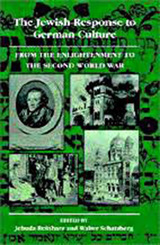
The Jewish Response to German Culture
From the Enlightenment to the Second World War
Jehuda Reinharz
Brandeis University Press, 1991
Seventeen scholars explore the interaction between a Jewish culture with its ancient heritage and an expansive German culture in the process of modernization.
[more]

Living with Antisemitism
Modern Jewish Responses
Jehuda Reinharz
Brandeis University Press, 1988
A collection of 22 essays by distinguished scholars on the Jewish response to antisemitism worldwide over the past 200 years.
[more]
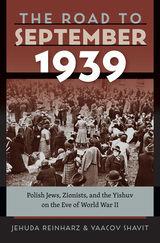
The Road to September 1939
Polish Jews, Zionists, and the Yishuv on the Eve of World War II
Jehuda Reinharz and Yaacov Shavit
Brandeis University Press, 2018
In European and Holocaust historiography, it is generally believed that neither the Zionist movement nor the Yishuv were mindful of the plight of European Jews in the face of the Nazi threat during the 1930s. Drawing on a wide variety of memoirs, letters, and institutional reports by people from all walks of life, this volume sheds new light on a troubled period in Jewish history. Jehuda Reinharz and Yaacov Shavit trace Jewish responses to developments in Eastern and Central Europe, as well as reactions to British policy on the question of a Jewish homeland, to show that Zionists in the Yishuv worked tirelessly on the international stage on behalf of their coreligionists in Europe. Nevertheless, their efforts were all too often shattered by the realities of their powerlessness and lack of resources. Piercing to the heart of conversations about how or whether to save Jews in an increasingly hostile Europe, this volume provides a nuanced assessment of what could and could not be achieved in the years just prior to World War II and Holocaust.
[more]
READERS
Browse our collection.
PUBLISHERS
See BiblioVault's publisher services.
STUDENT SERVICES
Files for college accessibility offices.
UChicago Accessibility Resources
home | accessibility | search | about | contact us
BiblioVault ® 2001 - 2025
The University of Chicago Press









